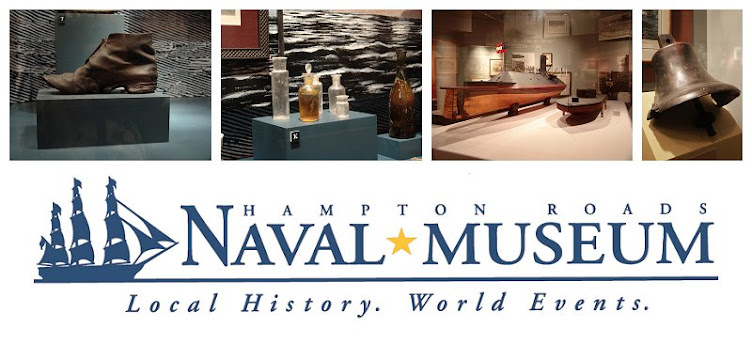This is a colored print of the epic battle between the Norfolk-built frigate USS Chesapeake and British frigate HMS Shannon that occurred on June 1, 1813 off the coast of Boston. The engraving can be seen in the museum's gallery. On the illustration are the words "To Captain Broke, the Officers, Seaman of the Shannon-This view of their boarding & capturing of the American frigate Chesapeake of Boston, the 1st of June, 1813, after a sanguinary conflict of 15 minutes, is with great respect, dedicated to them and admirers of British Valor. (Signed) G. Webster."
"G. Webster" refers to architect, stonemason, and artist George Webster of London (specifically, according to writing on the print, "21 White Lion Street, Pettionville"). He produced the original sketch of this illustration. Webster nominally made his living working alongside his father and brother rebuilding mansions, churches, and parks in the western part of England. He also had a talent for drawing, and the Royal Navy was one of his favorite subjects. For this image of Chesapeake and Shannon, he worked with Sir Captain Charles L. Falkiner to ensure accuracy. Falkiner was one of Shannon' senior officers and one of the officers who led boarding teams over to Chesapeake.
Webster turned over the original sketch to Joseph Jeakes, also of London, to colorize the illustration and reproduce the print in color. For this print, Jeakes used the aquatint technique of printmaking. Widely used in the late 18th and early 19th centuries, the process is used to create vivid color reproductions. The resulting collaboration between Webster and Jeakes produced a graphic depiction of the battle that accurately captures the violence of the battle in a way that other similar prints have not.
Having assembled one of the best-trained ship's companies in the world, Shannon's commanding officer Captain Philip Bowes Vere Broke led his crew to a deceive victory over Chesapeake and took the American frigate by boarding her. Despite the American captain uttering the legendary phrase "Don't Give Up the Ship!," the British did capture the ship and scored the greatest victory of the Royal Navy over the U.S. Navy during the War of 1812. Even though the battle was short, casualities were very high and it was one of the bloodiest single ship actions in the Age of Sail. Read more about the battle here.
"G. Webster" refers to architect, stonemason, and artist George Webster of London (specifically, according to writing on the print, "21 White Lion Street, Pettionville"). He produced the original sketch of this illustration. Webster nominally made his living working alongside his father and brother rebuilding mansions, churches, and parks in the western part of England. He also had a talent for drawing, and the Royal Navy was one of his favorite subjects. For this image of Chesapeake and Shannon, he worked with Sir Captain Charles L. Falkiner to ensure accuracy. Falkiner was one of Shannon' senior officers and one of the officers who led boarding teams over to Chesapeake.
Webster turned over the original sketch to Joseph Jeakes, also of London, to colorize the illustration and reproduce the print in color. For this print, Jeakes used the aquatint technique of printmaking. Widely used in the late 18th and early 19th centuries, the process is used to create vivid color reproductions. The resulting collaboration between Webster and Jeakes produced a graphic depiction of the battle that accurately captures the violence of the battle in a way that other similar prints have not.
Having assembled one of the best-trained ship's companies in the world, Shannon's commanding officer Captain Philip Bowes Vere Broke led his crew to a deceive victory over Chesapeake and took the American frigate by boarding her. Despite the American captain uttering the legendary phrase "Don't Give Up the Ship!," the British did capture the ship and scored the greatest victory of the Royal Navy over the U.S. Navy during the War of 1812. Even though the battle was short, casualities were very high and it was one of the bloodiest single ship actions in the Age of Sail. Read more about the battle here.


No comments:
Post a Comment